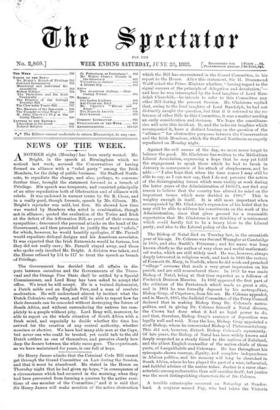The Bishop of Natal died on Tuesday last, in the
seventieth year of his age. Dr. Colenso was Second Wrangler at Cambridge in 1836, and also Smith's Prizeman ; and his name was long known chiefly as the author of very clear and useful mathemati- cal works, which are still widely used. He was, however, always deeply interested in religious work, and took in 1846 the rectory of Forncett St. Mary, in Norfolk, where he did work and preached "village" sermons that made a very great impression on his parish, and are still remembered there. In 1853 he was made Bishop of Natal, being at that time regarded as a follower of Frederick Denison Maurice. In 1862 appeared the first part of the criticism of the Pentateuch which made so great a stir, and in 1864 he was formally deposed by his metropolitan, Bishop Gray, of Capetown, from his see. Dr. Colenso appealed, and in March, 1865, the Judicial Committee of the Privy Council declared that in making Bishop Gray Dr. Colenso's metro- politan, and in giving Dr. Colenso himself a Natal diocese, the Crown had done what it had no legal power to do, and that, therefore, Bishop Gray's sentence of deposition was legally null and void. None the less, Bishop Gray appointed a rival Bishop, whom he consecrated Bishop of Pietermaritzburg. This did not, however, disturb Bishop Colcuso's equanimity. Of late years, the Bishop of Natal has been widely known and deeply respected as a steady friend to the natives of Zululand, and the ablest English counsellor of the native chiefs of those parts, of Langalibalele and Cetewayo. He has throughout his episcopate shown courage, dignity, and complete independence in African politics, and his memory will long be cherished in South Africa, where he has played the part of a wise, influential, and faithful adviser of the native tribes. Justice is a rarer char- acteristic among ecclesiastics than self-sacrifice itself; but justice was the most distinguishing characteristic of Dr. Colenso.


































